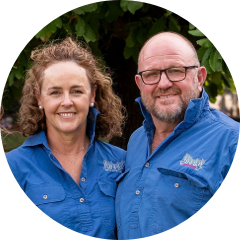Refining deep soil nitrogen testing to reduce environmental losses
This project was completed in 2018.
Project Officer
Dr Cassandra Schefe
WHY THIS PROJECT WAS NEEDED
Many grain growers conduct deep soil nitrogen (N) testing annually to understand how much nitrogen they have stored in soil, and how much is needed to meet the demands of the growing crop. This is generally done through the collection of multiple soil cores across a paddock down to 60 – 100 cm depth, which are all bulked together into one sample, to produce one value of stored nitrogen per paddock.
A weakness with this approach is that it does not provide an understanding of how potential nitrogen storage varies across a paddock, and where the nitrogen is stored in the soil; is it all accumulated in the top 10 cm, or is there a big bulge of nitrogen at 90 cm deep, beyond the reach of most roots and at risk of leaching to groundwater?
Further, the actual timing of this deep soil nitrogen (DSN) testing can vary, as sampling may occur at sowing, late autumn, or in late winter-early spring. This can result in large variations in the final nitrogen test results from the laboratory. Given test results are used to calculate the amount of nitrogen fertiliser to be applied to the crop, there is potential for large over-supply of fertiliser, potentially resulting in nitrate leaching to groundwater or the production of nitrous oxide (N2O), a potent greenhouse gas.
In short: This project demonstrated the importance of in-paddock variation and depth-incremented sampling in assessing deep soil nitrogen. By collecting samples at key stages and analysing plant growth, the project aimed to optimise nitrogen sampling and minimise fertiliser over-supply.
Project focus
This project established two on-farm demonstration sites to illustrate the value of considering paddock variation when sampling for nitrogen, and depth-incremented sampling to understand where the nitrogen is distributed in the soil profile.
Collecting deep nitrogen samples at key stages throughout the season also demonstrated how test values can change according to when the sampling was done. Assessments of plant growth stage and greenness (NDVI) were conducted at each stage to assist in defining the optimum time for sampling.
Project outcomes
Key messages from the project trials were that:
- While there was some movement of nitrogen (N) to depth (60–100cm), the concentrations were low and likely to be accessed by plant roots in subsequent seasons.
- Under current agronomic practice there is low risk of nitrate leaching to groundwater in these soils.
- While pre-sowing sampling gives an idea of ‘what is in the bank’ at the start of the season, a late June sampling would better account for fertiliser applied at, or after, sowing, enabling a more precise determination of nitrogen required to achieve a target yield.
- Nutrient sampling within zones, as determined by electromagnetic (EM) surveys, can provide a more accurate understanding of nutrient requirements given variations in soil type also equate to variations in nutrient storage and movement.
Read the full results, published in Research for the Riverine Plains, 2018.
Find out more
For further information. please email Riverine Plains Senior Project Officer Jane McInnes at jane@riverineplains.org.au
Project investment
MORE ON Soils & Grains
Our research enhances food production, increases environmental resilience and improves community connection across the Riverine Plains. See how our research creates impact.
-
Grains
Sustainability
-
Grains
Business
-
Grains
Sustainability
-
Grains
Livestock
-
Grains
Livestock
-
Soils
Sustainability
-
Soils
Sustainability
-
Grains
Sustainability
-
Grains
Business
-
Grains
Sustainability
-
Grains
-
Grains
-
Soils
Grains
-
Soils
Sustainability
-
Grains
Soils
-
Drought
Grains
-
Soils
Grains
-
Grains
-
Grains
Soils
-
Soils
Grains
-
Fodder
Grains
-
Grains
-
Soils
Sustainability
-
Grains
-
Soils
Sustainability
-
Grains
Soils
-
Sustainability
Grains
-
Grains
Sustainability
-
Soils
Grains
-
Soils
Climate
-
Grains
Sustainability
-
Soils
Climate
-
Livestock
Grains
-
Grains
Soils
-
Sustainability
Grains
JOIN RIVERINE PLAINS
Riverine Plains provides opportunities to see new research and innovation, connect with rural communities, and attend informative events.


